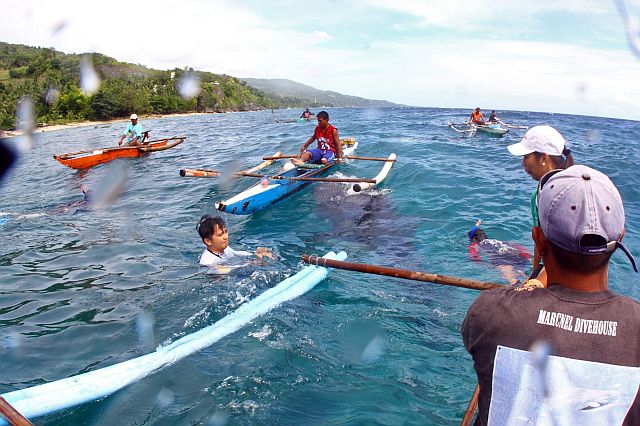Stakeholders to meet in Oslob for whale shark watching

Marine biologist Mario Marababol (left) of Ocean Care dives to watch Oslob’s famed whale sharks in this (CDN FILE PHOTO)
ENVIRONMENT and fishery officials will soon meet up with officials of Oslob town and the provincial government to discuss ways to regulate human interaction with whale sharks.
This came after the International Union of Conservation of Nature (IUCN) Red List of Threatened Species recently classified whale sharks — locally named as “butanding” — as endangered.
The assessment came from Dr. Simon Pierce of Marine Megafauna Foundation who is also a member of the IUCN Shark Specialist Group.
Eddie Llamedo, spokesman of the regional Department of Environment and Natural Resources (DENR-7), said a date has yet to be set.
He said the dialogue with Oslob officials and the provincial government in tandem with the Bureau of Fisheries and Aquatic Resources (BFAR) is needed before the DENR-7 issues a department administrative order (DAO) for the protection of whale sharks.
Llamedo said they hope the consultation will be scheduled next week since it will help them identify what activities will be prohibited and what possible measures should be in place to protect the remaining species of these whale sharks.
Llamedo said they received initial unconfirmed reports of decreased whale shark sightings last April in Oslob.
These reports will be included in their verification process to conduct an inventory of these species frequenting Oslob specifically off the waters of Barangay Tan-awan.
Llamedo said the last inventory they conducted was two years ago when there were at least 20 whale sharks sighted in the area.
Oslob Mayor Jose Tumulak Jr. said the dialogue should also include residents of Barangay Tan-awan.
Tumulak said Tan-awan fishermen relied on their income as boatmen for tourists who will pay a fee just to watch the whale sharks since whale-watching started in 2012.
“The drivers of motorcycle-for-hire and jeepneys as well as the resort owners and the residents of Tan-awan who rely on the whale-watching activities may also be affected,” Tumulak said.
Based on the town’s records, Tumulak said there are over 180 boatmen who are registered under the Tan-awan Oslob Whale Shark and Fishermen’s Association (TOWSFA).
Aside from boatmen, there are also feeders who lure whale sharks by feeding them “uyap” or krill. Whale-watching activities generated an income of P200 million last year.
A municipal ordinance states that 60 percent of this income would go to the accredited association which is TOWSFA; 30 percent to the local government unit; and 10 percent to Barangay Tan-awan.
Last year, TOWSFA earned P120 million, their share of the income; the municipal government received P60 million; and P20 million went to the barangay.
The dialogue will discuss, among other issues, limiting the exposure of the whale sharks and an education campaign for residents of Oslob on how they can help protect these marine creatures.
Whale shark-watching runs from 6 a.m. to 12:30 p.m. Tourists who wish to see them on board paddle boats are required to pay a registration fee of P300 for Filipino tourists and P500 for foreigners.
There are additional fees for snorkeling (P200 for Filipinos; P500 for foreigners) and diving (P500 for Filipinos; P1,000 for foreigners). The fees are lower for natives of Oslob.
They are required to pay P30 for the registration fee and an additional charges of P50 for diving and P20 for snorkeling.
Mario Marababol, a Cebu-based marine biologist, said the town can still continue their whale shark-watching activity provided there is a comprehensive management plan on the whale sharks.
Marababol, a marine biologist for 20 years now, said luring these whale sharks with feeds should be stopped as it alters their natural behavior to look for food.
Since an area in Oslob has been identified as a migratory highway for whale sharks and other species, Marababol said there is no doubt they would still frequent the area.
He said it is up to the Oslob government to do everything it can to preserve these creatures, including providing alternative livelihood to the fisherfolk if need be.
Disclaimer: The comments uploaded on this site do not necessarily represent or reflect the views of management and owner of Cebudailynews. We reserve the right to exclude comments that we deem to be inconsistent with our editorial standards.




